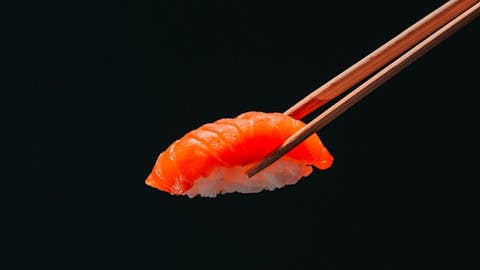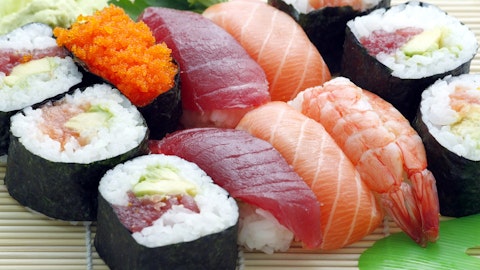Jeff Uttz: And Mark, one of the things we’ve always said is that when we thought about the FAST Act or AB 1228 came in, then we thought that would increase the value proposition for Kura Sushi. And I will tell you that yesterday, I ordered a salad for lunch from a chain to be unnamed, but they had — and it was even before delivery fees or anything, it was almost $20. And you can go to Kura Sushi, a plate for sushi and a soda for about that, maybe just a tiny bit more than that. So, our guess on what people were going to do with pricing on April 1st and how that increases our value proposition seems to be proven true, at least in the early stages of this new Act.
Mark Smith: Excellent. Other question for me is just looking at the opening cadence here, you guys did a good job getting restaurants opened here in the first half. With five under construction, the guidance of 13 to 14, are you just being a little conservative on those openings? Or do you think you can get these five open by the end of the year?
Hajime Jimmy Uba: In terms of the cadence, we just broke ground on one of them. So, it’s very early on in terms of the construction life cycle. The remaining units, we expect about an even split between Q3 and Q4. We think 13 to 14 units is a reasonable expectation, which is why we gave that as guidance.
Mark Smith: That’s fair. Thank you guys.
Jeff Uttz: Thank you, Mark.
Hajime Jimmy Uba: Thanks Mark.
Operator: Our next question comes from the line of Matt Curtis with William Blair. Please proceed with your question.
Matt Curtis: Hi, good afternoon. You guys ran a promotion to your Rewards members. So, I think with two visits in December, you gave them a 20% coupon valid in January. I was just wondering if you could tell us about how much the traffic benefit that wound-up delivering for you or what redemption rates were like? And then, I guess, related to whether you’re planning to run anything like this regularly going forward?
Hajime Jimmy Uba: In terms of the coupon campaign, without getting too deep — overall, we are very pleased. Obviously, with January, we had some noise from weather, which maybe resulted in less traffic than there would have been otherwise. But we still have 5.9% traffic for the quarter, our comps are 3%. We were really pleased. So, yes, overall, we view this as success.
Matt Curtis: Okay, got it. Do you mind telling us what the weather penalty was for the quarter?
Hajime Jimmy Uba: I’m sorry, can you repeat that?
Matt Curtis: Sorry, would you mind telling us what the weather penalty was for the quarter?
Hajime Jimmy Uba: For both January and February, we’ve about four operating days each that were very heavily-impacted. January, it was largely Texas, the Midwest, and some of the East Coast. California was hit during February. But yes, about eight days.
Matt Curtis: Okay, got it. Thank you. And then you talked about Dragon Ball being the promotion that’s coming this spring, I guess. You have SPY x FAMILY that’s been in place since I think March 1st. Could you remind us what promotions you’re lapping over this timeframe and how successful they were last year?
Hajime Jimmy Uba: So, as we discussed earlier, we’re really pleased with March results. We think in the small part was SPY x FAMILY was a very successful campaign. In terms of what we’ve been lapping, I believe it was Jujutsu Kaisen last year for April and May. So, a pretty strong one, but not the strongest, but — so we’re very pleased to be top rated [ph] the way that we are. Dragon Ball again, is really, I mean, it’s huge. It’s just huge. It’s really hard to predict what the impact is going to be, but we are super, super excited for May 1st.
Matt Curtis: Okay, understood. Thanks very much.
Hajime Jimmy Uba: Thanks Matt.
Jeff Uttz: Thank you, Matt.
Operator: Thank you. [Operator Instructions] Our next question comes from the line of CJ Dipolino with Craig-Hallum Capital Group. Please proceed with your question.
CJ Dipolino: Hi everyone, it’s CJ on for Jeremy Hamblin. I wanted to touch on labor cost one more time and just see if you were able to give a little more color, kind of quantify the penalty from adverse weather?
Hajime Jimmy Uba: So, as we mentioned earlier, we had about $700,000 in incremental preopening costs as compared to the prior year. The majority of those costs are in labor. And then we had about eight days of weather impact and you can’t change the schedule in real-time to deal with weather. So, yes, that would be the impact.
Jeff Uttz: So, eight days impacted, but full payroll in there.
CJ Dipolino: Okay. Thank you. And then on the other cost line item on P&L, I know you said you negotiate the DoorDash deal on really favorable terms, are you seeing any incremental expense that’s being added to that line item?
Jeff Uttz: No. DoorDash launched in February on a rolling basis. And so the impact in Q2 was not super meaningful. But in either case, we do expect DoorDash to be margin-neutral — or actually, our expectation is market-accretive, worst case it would be margin-neutral. And the other costs too are impacted also by the preopening costs, the two biggest lines that are impacting our P&L are labor and the other cost line. So, when you look at that other cost line whenever there’s a greater number of store openings, there’s travel and other costs associated with moving people around for those openings. So, the other cost line is impacted as well.
CJ Dipolino: Okay, right. Thank you. And then one more quick one, if you don’t mind. Sorry if you just touched on it, but once you break ground on a new restaurant, how long does it take? What’s the typical time to open from that point?
Hajime Jimmy Uba: It’s typically about five months. So, it’s been about five months historically. The last couple of quarters, we’ve seen that tighten a little bit with inspections at the end of construction going a little smoother. And so it’s been closer to four months and five months, but our base expectation is five months.



